trump

“ICE is coming into our communities and tearing apart families and tearing apart our community on a regular basis, and they did so just again last week,” Sanctuary DMV organizer Ben Beachy said. “We need our D.C. elected officials to make D.C. a real sanctuary city, which means severing all ties with ICE.”

Trump is fighting the battle on two fronts, trying to stop migrants from coming in the first place and deporting those who have been released into the United States.
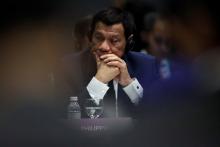
Impeachment suggests charging a president with misconduct that would disqualify them from public office — that’s not what Filipinos as asking for. Unseating Dutarte from office implies that there is a need for people power — a movement to assert democracy and not merely hang ones hopes in a system that has been known to fail or serve only a few. Impeachment calls the government to act, “unseat” calls the general masses to protest and hold government accountable.
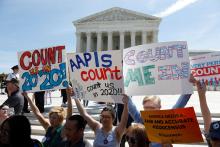
The court has a 5-4 conservative majority and has backed Trump in other high-profile cases. Conservative justices indicated a citizenship question would be eminently reasonable, noting that other countries use such questions and that the United States has done so in the past in one form or another.
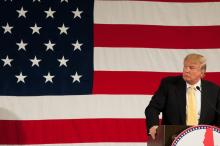
While, obviously, not everyone who spreads these memes is endorsing violence, its undeniable that some of the president’s supporters view them as a roadmap for the kind of radical action they believe it will take to “make America great again.” Cesar Sayoc, for example, affixed this very image to the window of his van before he mailed bombs to news outlets, Democratic politicians, and former government officials. And the truth, more broadly, is that we communicate much by what we find “humorous.” Even though many who traffic such imagery would never mail bombs, it strains credulity to say they are entirely disconnected from support for a president who openly wishes he could order the military to rough up migrants at the border, or who endorsed violence against protesters at campaign rallies.
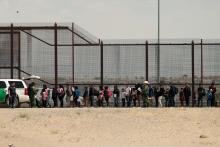
In June 2018, the Trump administration issued a “zero tolerance” policy in an effort to deter migrants, a majority from Central America, from entering the U.S. The policy resulted in the separation of nearly 2,800 immigrant children from their families at the U.S.-Mexico border in a little over a month.
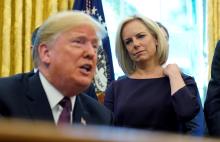
It will come as no surprise when President Trump continues his anti-immigrant agenda, ignoring well-established U.S. asylum law and putting children and families in harm’s way even after Secretary Nielsen’s abrupt departure. We know that President Trump forced Secretary Nielsen to resign to find someone willing to enforce even more cruelty at the border. The question now is what unchecked harm he will unleash after the purge of the Department of Homeland Security is complete.
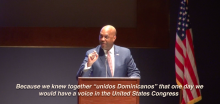
“The timing is right,” said Espaillat, noting that a delayed State of the Union ended up being well-timed with this pre-planned event. “Immigration will obviously have a keen interest among the participants because many folks came here undocumented or many folks are still trying to reunite with their families or are in transition with regards to their DACA status.”

President Donald Trump began his week tweeting about biblical literacy: "Numerous states introducing Bible Literacy classes, giving students the option of studying the Bible. Starting to make a turn back? Great!" By great, he means great for him — in the way that someone who is desperately parched might call anything wet, “great!” For the vast majority of us — Christian or not — the religious nationalism Trump binge drinks when he’s feeling politically vulnerable is really bad.
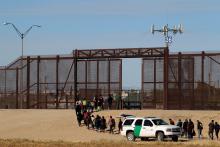
The U.S. government will return the first group of migrants seeking asylum in the United States to the Mexican border city of Tijuana on Friday, U.S. and Mexican officials said, marking the start of a major policy shift by the Trump administration.
The policy, dubbed the Migrant Protection Protocols (MPP) and first announced on Dec. 20, will return migrants, including non-Mexicans, who cross the U.S. southern border back to wait in Mexico while their asylum requests are processed in U.S. immigration courts.

As the federal government shutdown enters a painful second month, the human consequences and costs continue to grow. President Trump’s sham “compromise” over the weekend failed to break the impasse as Democrats continue to hold firm to the principled demand that negotiations over border security take place only after the government is reopened. Today, the Senate is set to vote on this “compromise” as well as a bill that would simply reopen the government for a few weeks to allow serious negotiations without the operations of the government held hostage. The second bill is the one we should urge senators to vote for, though the president and Republican Leader Mitch McConnell are urging Republican senators to vote against it as Trump feels its passage would weaken his negotiating position.

This week, conservative pundit Laura Ingraham announced that President Donald Trump would be hosting the young men from Covington Catholic who attended the March for Life, where they got into an altercation with participants in the Indigenous People’s March. It’s unclear whether the administration has extended an invite, but Trump has taken to Twitter to voice his support for the young men. He’s also made clear over the course of his presidency and campaign his disregard for the voices of Indigenous people — whether by slashing the size of Bears Ears National Monument, greenlighting pipelines that impact Native lands, or using racist and derogatory terms to instigate fights with Sen. Elizabeth Warren over claims to Native heritage.

The U.S. Supreme Court on Tuesday let President Donald Trump enforce his policy barring certain transgender people from joining or staying in the military as the justices put on hold lower court rulings blocking the plan on constitutional grounds.
“They struggle in the absence of information.”
With Brexit, the chumocrats who drew borders from India to Ireland are getting a taste of their own medicine.

Leaders want to spend billions, not to help people living in desperation, but on the wall. We must ask ourselves, and our elected leaders, what are the true costs when we allow ourselves to be consumed by fear? Are we willing to put the wall ahead of the God of mercy who came to us as a child fleeing violence? Thousands of God’s children remain in the squalor of tent cities in Tijuana and detention centers, unwelcome in Mexico and the United States. Some are returning to violence at home having lost any hope for asylum they are legally entitled to request.
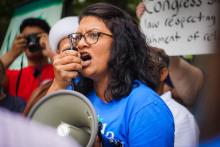
Today, civility policing is just one more layer of rhetorical fog which obscures the truth of our political reality ─ how poverty and cruelty are manufactured and sustained by the policy regime of America’s ruling class. In reality, the Trump tax cut is uncivil, the American support of Saudi Arabia’s war in Yemen is uncivil, the prison-industrial complex is uncivil, ripping families apart at the border is uncivil.

First, racism is always based on lies; it always has been and always will be. We saw that again in Donald Trump’s address to the nation on Tuesday. It was more of the same lies he has used since he announced his presidential candidacy in 2015. He used his lies last night to try to justify his border wall, the signature issue of his political campaign and administration, which people on both sides of the aisle have said has nothing to do with border security and everything to do with Donald Trump’s central message: You should fear people who aren’t white. The wall would be Donald Trump’s 2,200-mile monument to white supremacy. As I have said before, in Trump’s political campaign he become the Chief Tempter of America’s Original Sin. Now as president, he has become the Chief Defender of America’s Original Sin.

Strongmen, autocrats, and dictators don’t all do the same things. They do whatever they can to maximize their own wealth, power, and fame. The only thing that prevents them from going as far as they can is the resiliency of a society’s institutions and social sectors — like the media, the judiciary, political parties, law enforcement, civil society, and places of vocational or historical moral authority like faith communities.
So how are we faring on those fronts?
A look back at Sojourners favorite stories in 2018, Lin-Manuel Miranda, modern parenting, and more on this week's Wrap!
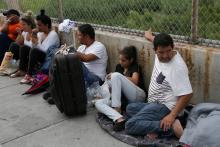
A U.S. judge struck down Trump administration policies aimed at restricting asylum claims by people citing gang or domestic violence in their home countries and ordered the U.S. government to bring back six deported migrants to reconsider their cases.